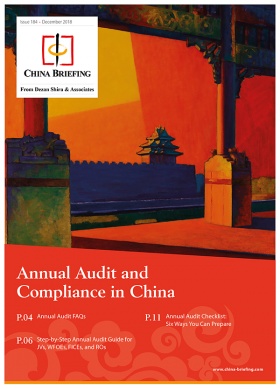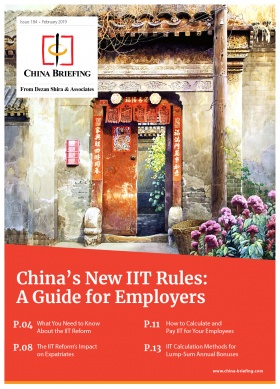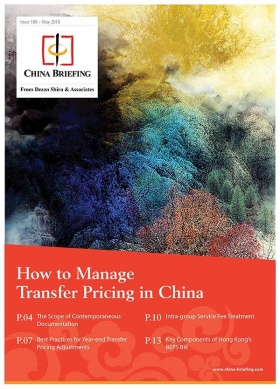China and Italy New Double Taxation Agreement to be Effective in 2025
UPDATE (November 12, 2024): On November 5, 2024, the Italian Chamber of Deputies finalized the ratification of a landmark tax treaty with China to eliminate double taxation on income and curb tax evasion and avoidance. This long-anticipated agreement, signed in 2019 and now fully approved, will update direct tax regulations between Italy and China, creating a more stable environment for bilateral investment.
The treaty’s ratification promises substantial benefits for Italian businesses operating in China, simplifying tax structures and easing the complexities around profit repatriation. Scheduled to enter into force in 2025, it will offer enhanced planning opportunities for Italian companies while fostering a stronger economic link between the two nations.
The China-Italy Chamber of Commerce and the Italian Embassy in China actively advocated for this agreement, highlighting its significance to Italian institutions and stakeholders. Since September 2024, following Italian Senate approval, momentum grew for final legislative action, culminating in the Chamber of Deputies’ unanimous endorsement this month.
This treaty underscores a shared commitment to fostering a transparent and mutually beneficial economic relationship for Italy-China relations. Both nations anticipate that the new framework will significantly enhance bilateral investment flows, providing a stable and equitable platform for cross-border commerce in the years to come.
China and Italy have updated their bilateral double tax agreement (DTA) to encourage investment and provide greater fiscal certainty as the two countries grow closer economically.
On March 23, 2019, China and Italy announced they signed a new DTA, which partially revises the previous 1986 China-Italy Double Tax Agreement. The new China-Italy DTA shall enter into force in 2025.
While the previous DTA broke down many of the barriers that obstructed cross-border trade, investment, and knowledge exchange between the two countries, this revised agreement is poised to give Chinese and Italian investors even more favorable terms when doing business with each other.
China-Italy DTA: The key changes introduced
The most notable changes in the agreement are in the areas of taxation of dividends, interest, and royalty payments, as well as capital gains. Italian investors in China should take note of the changes to plan and optimize their new tax liabilities accordingly.
The new DTA states that beneficial owners who own at least 25 percent of the share capital of a given entity will be eligible for a lower five percent tax rate, as opposed to the standard 10 percent rate that applies under domestic Chinese law.
Investors will also be subject to a reduced eight percent tax rate – down from 10 percent – on interest for loans taken out for investment projects. Additionally, investors will be able to benefit from tax exemptions for interest payments relating to securities issued by specified Italian financial institutions.
Moreover, tax on royalties relating to the right or the right to use industrial, commercial, and scientific equipment will be subject to a reduced five percent rate, compared to seven percent previously. Notably, this gives Italy preferential treatment over other European countries that have entered into double tax agreements with China, who are generally subject to a tax rate of at least six percent on royalties.
Regarding capital gains, the revised DTA provides that only capital gains held with a level of participation of at least 25 percent at any time over the 12 months prior to sale will be subject to taxation. Further, all capital gains not expressly regulated shall be taxable only in the country where the seller is a tax resident.
The following table is a summary of the key changes and intended effects of the DTA.
Deepening bilateral ties
Italian President Sergio Mattarella’s recent state visit to China, from November 7 to November 12, 2024, has marked a pivotal moment in Italy-China relations, emphasizing balanced trade, increased investments, and deepened cultural and academic cooperation.
During talks with Chinese President Xi Jinping and Chinese Premier Li Qiang in Beijing, President Mattarella highlighted Italy’s commitment to stronger economic ties with China. Trade between the two countries doubled from EUR 38 billion in 2016 to EUR 74 billion in 2022, yet President Mattarella noted that current levels are still below potential. He emphasized the need for more balanced trade and urged China to increase its investments in Italy, mirroring Italy’s growing investments in China, which reached EUR 15 billion in 2023. These discussions underscored a shared vision of enhancing bilateral economic exchanges, with both countries seeking a more equitable flow of trade and investments.
Cultural ties were another focal point of the visit. On November 8, President Mattarella and President Xi jointly attended the China-Italy Cultural Cooperation Mechanism Conference and the Dialogue between Chinese and Italian University Presidents, celebrating the enduring cultural partnership between the two nations. President Xi praised the thousand-year-old history of exchanges, beginning with the Silk Road and later Marco Polo’s travels, which opened a significant cultural bridge between East and West. He emphasized that in today’s era of global transformation, Italy and China should advocate for unity, peace, and mutual understanding, using their ancient cultures as a foundation to build a shared future.
Italian Deputy Prime Minister and Minister of Foreign Affairs Antonio Tajani also played a key role by signing three major cultural agreements: a consultation mechanism between the ministries of education, an Executive Programme of Cultural Cooperation, and a pact for translating classical Italian and Chinese works. Minister Tajani underscored the importance of cultural diplomacy, honoring the 700th anniversary of Marco Polo’s death as a symbol of longstanding intercultural learning. He added that Italy and China’s joint exploration of digital innovation in cinema and live entertainment marks a new chapter in their relationship, blending historical heritage with modern technology to enrich both societies.
This visit, closely following Italian Prime Minister Giorgia Meloni’s trip to China in July, highlights the strategic importance Italy places on China relations. Through initiatives in trade, investment, and cultural diplomacy, both nations are poised to create a robust, forward-looking partnership built on mutual respect and shared goals. This strengthened collaboration not only boosts Italy-China relations but also sets a model of peaceful and cooperative international engagement.
Also Reade:
China and Italy to ‘Relaunch’ Bilateral Ties: Trade and Investment Outlook
This article was first published on April 10, 2019, and last updated on November 12, 2024.
About Us
China Briefing is produced by Dezan Shira & Associates. The firm assists foreign investors throughout Asia from offices across the world, including in Dalian, Beijing, Shanghai, Guangzhou, Shenzhen, and Hong Kong. Readers may write to china@dezshira.com for more support on doing business in China.
- Previous Article China and Italy to ‘Relaunch’ Bilateral Ties: Trade and Investment Outlook
- Next Article Optimizing Tax Benefits Through One-Off Deduction Policy for Fixed Assets Under RMB 5 Million










